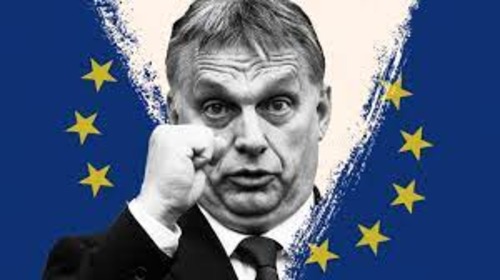The ongoing war in Ukraine since February 2022 has grown into an important turning point for the European Union. The EU has taken quick action to aid Ukraine both militarily and economically by imposing strict sanctions on Russia, which has been- a point of discontent for Hungary. Viktor Orban keeps on disputing the EU’s nonviable approaches, fueling ongoing irritation between Hungary and the European Union.
Hungary frequently keeps on utilising its ability to veto major EU decisions as a negotiating tool. In his own country, he has emphasized the Hungarian government’s disagreements with Brussels, often appearing to fabricate them, and presented himself as a major player in the European arena. However, in recent weeks, Europe’s major hitters have gotten visibly upset with Hungary’s increasingly isolated leader. Another attempt to enact a 50-billion-euro ($54 billion) amendment to the EU budget that would assist Ukraine over the next four years is the main agenda item for leaders of the European Union. During the regular conference in December, Hungary blocked that proposal in addition to 20 billion euros ($21.7 billion) in military funding to Ukraine until 2024. This week, he protested the Ukraine aid package once more in front of a summit that was specifically scheduled to win his support.
Join us on Telegram: https://t.me/tfiglobal
Hungary’s Prime Minister Viktor Orban has publicly underlined his connections to the Kremlin, diverging from the broader European Union (EU) approach of isolating Moscow owing to the current crisis. Last month, Budapest used its veto power to prevent financial help to Kyiv and has expressed doubts about military support. If Orban retains his attitude, the EU is looking into additional ways to support Ukraine. However, every option is expected to be more complex, time-consuming, and expensive. The draft summit conclusions do not definitively state whether leaders will commit an additional 5 billion euros to the European Peace Facility (EPF), a fund used to deliver arms to Kyiv. EU member states still differ in their views on the fund’s possible contribution to providing military assistance to Ukraine, with Hungary taking the lead.
Read More: Hungary Standing off is Threatening Ukraine’s Fate
Furthermore, Hungary has once again made headlines. Orban’s party has chosen to abstain from voting on the NATO expansion, making Hungary the lone dissenting voice in endorsing Sweden’s attempt to join the US-led military alliance.
Legislators from Hungary’s ruling party have refused to attend an emergency vote on Sweden’s application to join NATO, insisting the Nordic state’s leader must meet with Prime Minister Viktor Orban before they decide on the issue.
In a statement issued on Monday, Fidesz said that the ratification vote should take place during a regular parliamentary session, but added: “we are expecting the Swedish prime minister to visit Hungary first.”
“If this is an important issue for the Swedes, the Swedish prime minister will obviously come to Budapest,” Orban’s party added.
Swedish Prime Minister Ulf Kristersson has expressed his willingness to make the trip, but said he would only do so after his country’s NATO application was approved, leaving it unclear how Fidesz lawmakers would proceed.
Though Hungary has condemned Russia’s military action in Ukraine – which prompted NATO applications from both Sweden and Finland – it has declined to follow other EU states in sanctioning Moscow or providing arms to Kiev. The parliament in Budapest voted for Finnish accession last March following months of political wrangling, but has delayed a decision on Stockholm’s bid for months.
Orban has repeatedly called for a ceasefire in Ukraine and for peace talks between Moscow and Kiev, insisting that Ukraine cannot hope to defeat Russia on the battlefield. His stance, as well as Budapest’s opposition to sanctions on Russia and its blocking of EU military aid to Ukraine, has seen Hungary vilified in Kiev and threatened with counter-sanctions by Brussels.
Hungary joined with Turkey in adding new obstacles to Sweden’s NATO proposal, with Budapest set to ask for more agreements from its Western partners before ratifying the military alliance’s expansion.
Not to mention, earlier how the EU fooled Orban to let Ukraine into the Group, but Orban had the last laugh.
Read More: EU FOOLED Orban to let Ukraine into the Group, but Orban will have the Last Laugh!
Just a month back, in a leaders summit discussions regarding Ukraine’s potential accession to the EU, deadlock ensued among EU leaders. About three hours into deadlocked discussions among them, the German chancellor proposed to Hungarian Prime Minister Viktor Orbán: Grab a coffee outside the room, perhaps.
The idea, Scholz said, would allow the 26 EU leaders who remained to approve Ukraine’s road to accession with the required unanimity — which EU rules say is also fulfilled if one leader is absent.
This time too, diplomats and officials were skeptical about Hungary’s possible obstruction.
In the EU an air of perpetual uncertainty hangs over whether Budapest will fall in step with the convictions of the other 26 member nations, and Hungary, true to form, never fails to defy expectations. It’s an enduring saga of Hungary standing resolutely against the tide of EU consensus.
